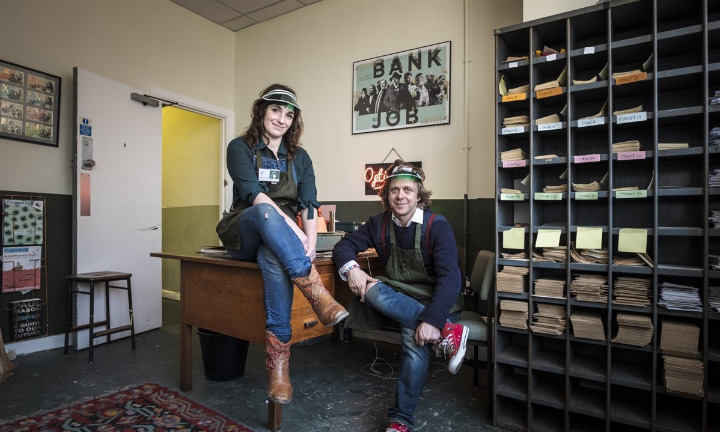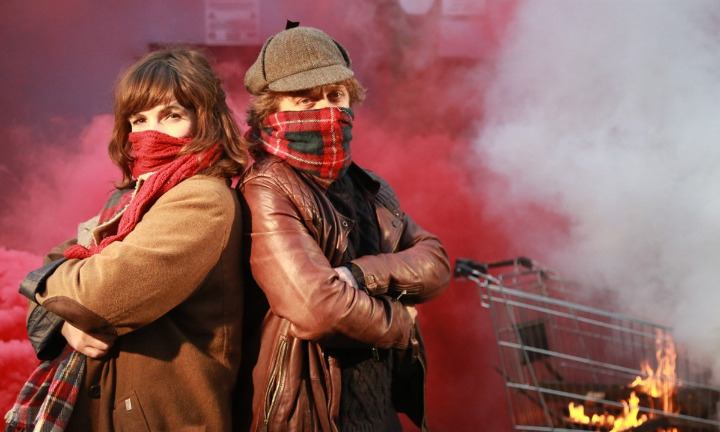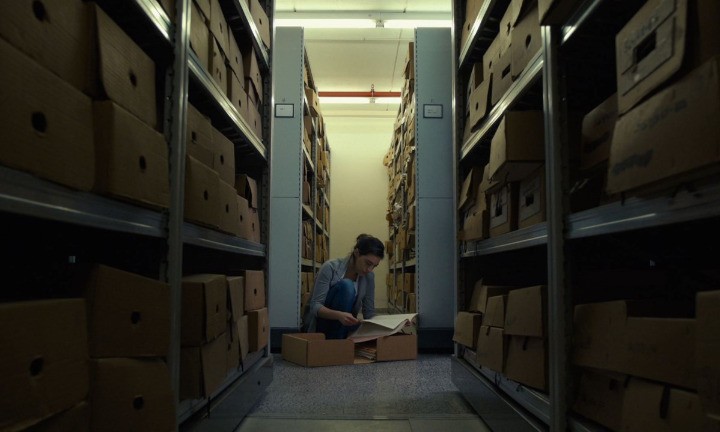Bank Job is a decidedly unserious film about a serious subject: debt. Filmmaking duo Dan Edelstyn and Hilary Powell document their grassroots debt-abolishing project in a new documentary with a fictional heist twist. It might be the most fun you have at Hot Docs, if you buy into the scheme.
“You could make a film with lots of talking heads, but that’s so boring,” says Edelstyn. “We wanted to try and live the adventure somehow, so we looked for a film structure that could bring that to life.”
The result is a docu-fiction film that interweaves some kooky fictional scenes with serious community activism. In explaining how debt works and their elaborate plan to buy and cancel random debts in their neighbourhood, Edelstyn and Powell put themselves in a faux-interrogation room.
It was their way of explaining a challenging concept with a kitschy twist, born out of the limitations of piecing together a film during lockdown. The black-and-white interrogation scenes hold the viewer’s hand through an introduction to economics and debt. The invented figure of the incredulous, biting interrogator allows the film to voice and address common skeptical questions about their radical scheme.
“We didn’t set out thinking we were going to have to film those [scenes]],” said Edelstyn. “It became clear in the edit that we needed to help people understand why we were doing what we were doing. It wasn’t necessarily obvious to viewers in a succinct way.”
The documentary chronicles a movement started by the couple to raise money to buy and write off random peoples’ debt in their London neighbourhood. Part activism, part art project, Bank Job is commendable for the impact and success of the mutual aid effort it documents.
The idea for the scheme was born of the aftermath of Edelstyn’s 2012 documentary, How to Re-Establish a Vodka Empire, which also starred himself and Powell in a highly personal journey, to retrace his family history. It ended on a sour note.

“The mafia took over my great grandparents’ distillery that we’d started to import vodka from, and I had a kind of crisis of not knowing what to do next,” said Edelstyn.
In the soul-searching that followed, Edelstyn’s reading led him to debt-abolition movements like Strike Debt, one of the first of its kind. He wanted to see if he and Powell could raise money to buy and cancel debt in a similar way in Britain, and Bank Job was born.
After a visit to New York for information and inspiration, Bank Job starts in the couple’s community of Walthamstow, a borough in North London. The film introduces key community members who are dealing with the fallout of the current economic system, from the head of a food bank to a school principal facing deep budget cuts.
“It was building up from that kind of community thinking that we got to thinking of it as a community heist on the financial system,” said Powell. “That mischievous element attracted people, as well as its more worthy aspects of raising money for local causes.”
The fundraising idea at the heart of the project involves the reclamation of money. The couple decides to create their own banknotes, a “currency” of physical art prints, which they sell to raise money that will buy up the debt. The faces of the notes feature a handful of key community members.
The project really comes together, on-screen and in real life, when the couple rents an old bank building and establishes their own physical “bank.” They name it “HSCB” – Hoe Street Central Bank – and transform the neglected building into an intriguing storefront. They recruit volunteers that sport bank teller visors and sit at desks with banker’s lamps.
“The heist genre that we began to play with helped capture the imagination locally as well, because it’s always very difficult to talk about debt and money and all of these very abstract ideas,” said Powell. “In the case of the bank, when you’re printing money, it’s very tactile and material, so it was helpful with these more abstract concepts.”
In the back, volunteers practice their screen-printing skills to print the “money.” People wander into the unusual-looking “bank” and learn about the project. By the film’s end, the “bank job” raised £40,000 (or nearly $70,000 CAD).
Half the money is given back to the community, and half is used to buy off £1.2 million of debt and destroy it. Because of the way debt collection works, the film explains, debt is bought and sold among collectors until the actual cost of buying the debt is heavily discounted.
“The film is about learning what’s just under the bonnet of the financial system,” said Edelstyn. “That knowledge gives us some power in being able to look at how we should change it.”
The theatrical cherry on top is the film’s money shot. The team blows up a van full of the debt slips they’re writing off. It was the crux of Edelstyn’s “bank heist” docu-fiction fantasy, and it almost fell apart.

Edelstyn wanted to stage this slice of performance art in a field at the foot of some of London’s biggest business towers, for dramatic effect. The crew worked with professionals to plan a safe explosion and applied for permission from the city. Though the city had problems with the “political message” of the stunt, with help from lawyers, the Bank Job team was able to pull it off. The explosion garnered media attention and snagged an action-movie style shot for the heist-themed doc.
“We’re always looking for a structure that will bring some real-life jeopardy out,” said Edelstyn. “We have a perverse love of when things go wrong for us, because then that gives an opportunity for the film to get more interesting.”
The conclusion of the film was supposed to be a final act of “sticking it to the man” – buying the building their guerilla bank was housed in. In the end, they didn’t have the funds. Still, the Bank Job project lives on through the film, a book, and an ongoing community effort that may be branching out into other areas in the future.
“If we, as a little family with no experience in activism, can launch a project that can abolish a million pounds of debt, then imagine what we could do if we all properly got together and took action,” said Edelstyn. “I think that’s the emotional backbone of it.”
Bank Job premieres at Hot Docs 2021.











